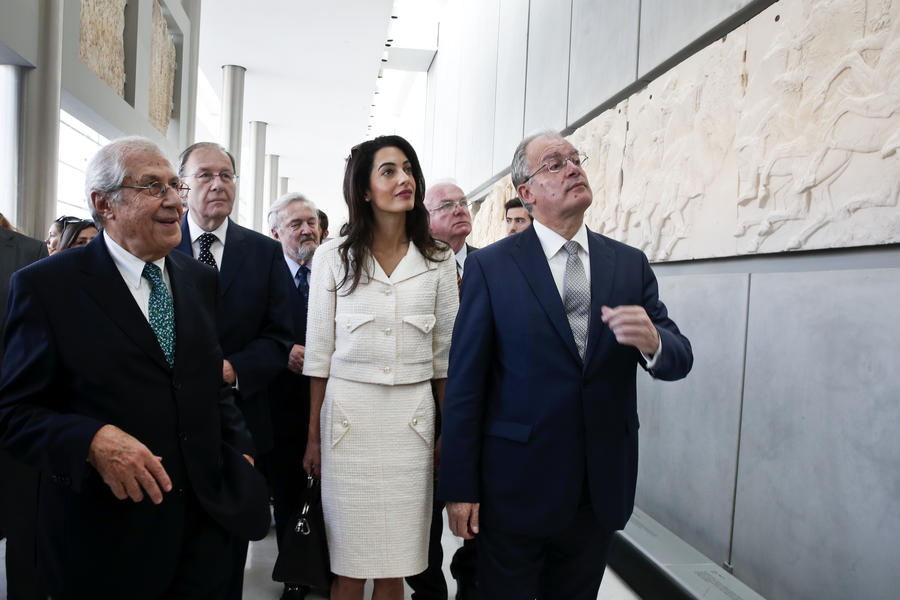Greece thinks Amal Alamuddin Clooney could solve the West's longest-running cultural spat


A free daily email with the biggest news stories of the day – and the best features from TheWeek.com
You are now subscribed
Your newsletter sign-up was successful
Amal Alamuddin Clooney might be on her way to remembrance for her involvement with a controversial part of the Parthenon.
Last month, Doughty Street, where Clooney is a barrister, announced that Clooney would visit Athens from Oct. 13-16 to advise the Greek government about the Elgin Marbles. The Elgin Marbles are a set of Greek marble sculptures that were originally part of the Parthenon and other acropolis buildings. They are currently on display at the British Museum, but Greece has long hoped to reclaim the statues.
The 2,500-year-old Elgin Marbles, which date to the fifth century B.C.E., have fueled a wider debate among art historians over whether works of art should be returned to their home countries. The discussion about the sculptures' location has become "the West's longest-running cultural row," The Guardian notes. The sculptures were moved to London in the early 19th century, "when it was considered fashionable for major European powers to collect ancient art from other cultures," according to The Associated Press. They gained their current name when Lord Elgin sold them to the British Museum between 1801 and 1805.
The Week
Escape your echo chamber. Get the facts behind the news, plus analysis from multiple perspectives.

Sign up for The Week's Free Newsletters
From our morning news briefing to a weekly Good News Newsletter, get the best of The Week delivered directly to your inbox.
From our morning news briefing to a weekly Good News Newsletter, get the best of The Week delivered directly to your inbox.
Clooney, along with lawyer Geoffrey Robertson, hosted talks with various government officials in Greece, including the Greek prime minister and the culture minister. Clooney and Robertson also visited the Acropolis Museum, which is home to the portion of the Elgin Marbles that aren't in the U.K.
Costas Tassoulas, Greece's culture minister, said at a press conference Wednesday that UNESCO, the U.N.'s cultural branch, is urging Britain to reconsider a year-old proposal to join in a "mediation process" to decide the sculptures' fate. Greece hopes to regain all of the Elgin Marbles that were once part of the Parthenon. If its efforts are successful, the country would display the collection at a museum near the Acropolis Hill.
A free daily email with the biggest news stories of the day – and the best features from TheWeek.com
Meghan DeMaria is a staff writer at TheWeek.com. She has previously worked for USA Today and Marie Claire.
-
 6 exquisite homes with vast acreage
6 exquisite homes with vast acreageFeature Featuring an off-the-grid contemporary home in New Mexico and lakefront farmhouse in Massachusetts
-
 Film reviews: ‘Wuthering Heights,’ ‘Good Luck, Have Fun, Don’t Die,’ and ‘Sirat’
Film reviews: ‘Wuthering Heights,’ ‘Good Luck, Have Fun, Don’t Die,’ and ‘Sirat’Feature An inconvenient love torments a would-be couple, a gonzo time traveler seeks to save humanity from AI, and a father’s desperate search goes deeply sideways
-
 Political cartoons for February 16
Political cartoons for February 16Cartoons Monday’s political cartoons include President's Day, a valentine from the Epstein files, and more
-
 Nobody seems surprised Wagner's Prigozhin died under suspicious circumstances
Nobody seems surprised Wagner's Prigozhin died under suspicious circumstancesSpeed Read
-
 Western mountain climbers allegedly left Pakistani porter to die on K2
Western mountain climbers allegedly left Pakistani porter to die on K2Speed Read
-
 'Circular saw blades' divide controversial Rio Grande buoys installed by Texas governor
'Circular saw blades' divide controversial Rio Grande buoys installed by Texas governorSpeed Read
-
 Los Angeles city workers stage 1-day walkout over labor conditions
Los Angeles city workers stage 1-day walkout over labor conditionsSpeed Read
-
 Mega Millions jackpot climbs to an estimated $1.55 billion
Mega Millions jackpot climbs to an estimated $1.55 billionSpeed Read
-
 Bangladesh dealing with worst dengue fever outbreak on record
Bangladesh dealing with worst dengue fever outbreak on recordSpeed Read
-
 Glacial outburst flooding in Juneau destroys homes
Glacial outburst flooding in Juneau destroys homesSpeed Read
-
 Scotland seeking 'monster hunters' to search for fabled Loch Ness creature
Scotland seeking 'monster hunters' to search for fabled Loch Ness creatureSpeed Read
